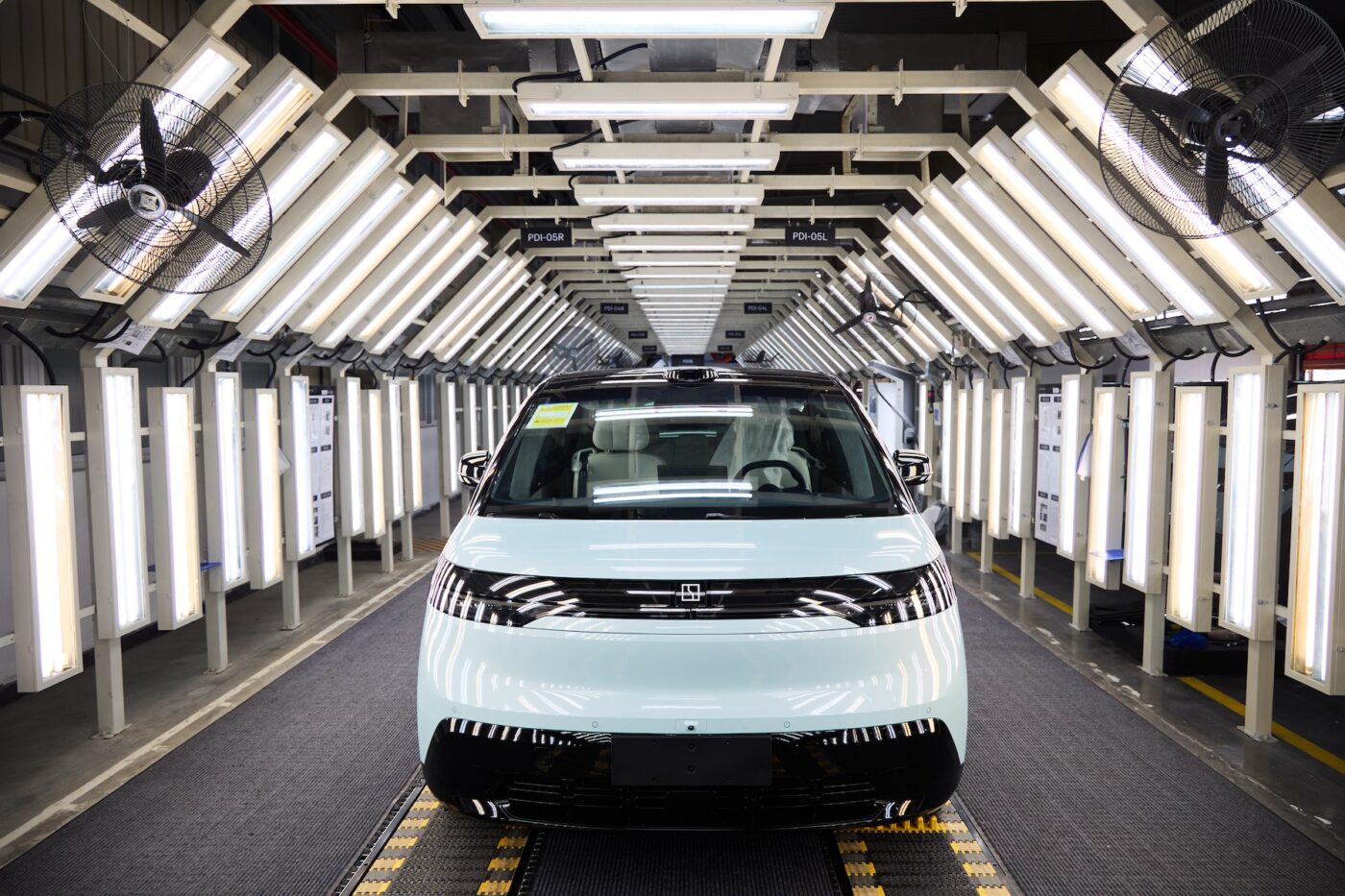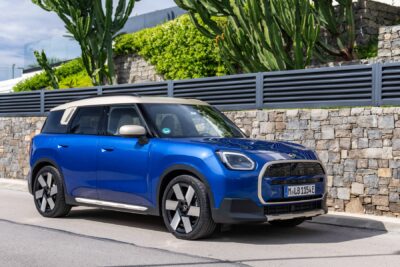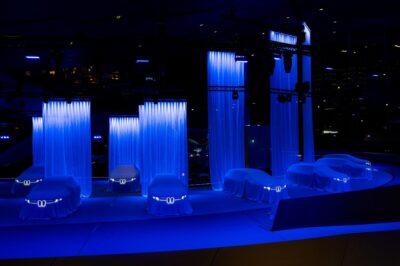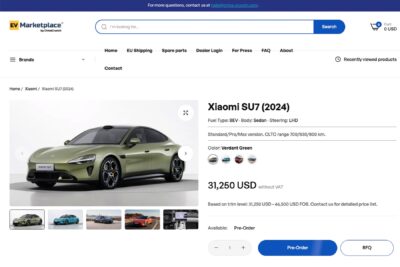Over 1.5 million electric vehicles made in China sold in November
October saw 1.43 million passenger new energy vehicles (NEVs) sold that were made in China. This marks the second all-time record after the 1.29 million NEV cars in September 2024. In comparison, November 2023 saw NEV car sales exceed the million mark for the first time ever. Cars that are new energy vehicles primarily include passenger battery electric vehicles (BEV) and passenger plug-in hybrids (PHEV) and theoretically also fuel cell vehicle (FCEV) cars, although these play only an increasingly subordinate role in passenger car markets.
However, with 1,512,000 New Energy Vehicle cars, the 1.5 million mark was only surpassed in November if one considers the so-called wholesale sales – this includes all cars built in China, i.e. also those 83,000 cars (-35.2 per cent) that were exported. However, if these export sales are excluded, there are still 1,429,000 units sold in China (+53.8 per cent year-on-year and +9.7 per cent compared to October). This figure also represents the third record in a row.
Despite the records for cars with an electric motor, the overall passenger car market in China also grew to 3.316 million cars in November, an increase of 8.6 per cent compared to October. As the overall market has, therefore, grown more than NEV sales, the NEV share of total registrations has fallen slightly from 46.8 to 45.6 per cent. In November 2023, however, it was still 34.5 per cent.
While NEV car growth was recently driven by booming demand for plug-in hybrid cars, battery electric cars were in high demand in November. At 908,000 vehicles, passenger BEVs were up 7.8 per cent compared to October and even 29.3 per cent for the year as a whole. However, growth in plug-in hybrid cars slowed somewhat compared to October, with an increase of 2.9 per cent to 604,000 vehicles. Compared to November 2023 with an increase of 86.8 per cent, however, the latest surge in demand is clear. Within passenger New Energy Vehicles, the ratio of BEVs to PHEVs was 66.5 to 33.5 in November.
The market development between battery electric cars and partially electric vehicles can also be clearly seen in the figures from market leader BYD. With 506,804 passenger NEVs, BYD sold more than half a million cars for the second month in a row – but this was only a minimal increase of 0.8 per cent on the 502,657 vehicles sold in October. With 198,065 sales, BEV sales were up 4.5 per cent, while passenger PHEV sales at BYD actually fell by 1.6 per cent to 305,938 vehicles. Incidentally, 28,141 of the 506,804 NEV cars were exported.
The situation is similar at Geely, where NEV car sales rose by an impressive 94 per cent to 122,453 units over the year, with passenger BEVs increasing by 173 per cent to 91,333 units, while plug-in hybrid cars were only up five per cent at 31,120 vehicles. Just over 75,000 vehicles were attributable to the NEV brand Galaxy, around 27,000 to Zeekr and 32,700 to Lynk&Co. Zeekr is aiming for 230,000 sales for the year as a whole; after eleven months, the brand stands at 194,933 vehicles.
The SAIC Group sold 176,869 passenger new energy vehicles in November, 16 per cent more than a year ago. However, NEV car sales are not broken down by brand – it is unclear what sales figures brands such as MG, Im Motors SAIC GM Wuling or SAIC-Volkswagen contributed to the overall result.
November was a stronger month for Tesla in China, with wholesale sales totalling 78,856 electric cars, after October was the weakest month since April. The China-only figures of 73,490 vehicles are a positive result for the company, as they are the highest figure for the current year. However, this also means that exports from Giga Shanghai fell to 5,366 electric cars—the lowest level since June 2022.
Stellantis partner Leapmotor broke the 40,000 deliveries mark for the first time in November. With 40,169 electric cars, the enormous growth since the summer has continued, even if the curve has flattened somewhat compared to October (+5.2 per cent). A year ago, however, Leapmotor delivered around 18,500 cars. With 251,207 vehicles, Leapmotor has already reached its annual target (250,000 cars).
The Changan brand Deepal delivered 36,036 passenger electric vehicles in November, 123 per cent more than in the previous year and 29.3 per cent more than in October. The Deepal S07, which has been on sale since July, accounted for 16,766 of these vehicles. The cheaper S05, which has been on sale since October, has also already achieved five-digit sales.
Nio delivered 20,575 electric cars in November (+28.9 per cent), of which 15,493 were from the main Nio brand and 5,082 from the new Onvo brand, which is intended to appeal primarily to families with more affordable cars. So far this year, Nio has sold 190,832 electric cars and is, therefore, likely to significantly exceed 200,000 units. Although Nio has made gains, it has been beaten by Xpeng with 30,895 deliveries. Xpeng’s growth was primarily driven by the Mona M03 model, which achieved five-digit sales for the third month in a row. According to the company, more than 7,000 units of the revised Xpeng P7+ were delivered in the first 23 days.
The Ji Yue brand, backed by Geely and Baidu, sold 2,485 cars in November—20 per cent fewer than in October.
cnevpost.com (CAAM), cnevpost.com (BYD), cnevpost.com (Tesla exports), cnevpost.com (Tesla China sales), nio.com (Nio), xiaopeng.com (Xpeng), gasgoo.com (Geely), cnevpost.com (Zeekr), cnevpost.com (Leapmotor), gasgoo.com (SAIC), gasgoo.com (Deepal), gasgoo.com (Ji Yue)





0 Comments